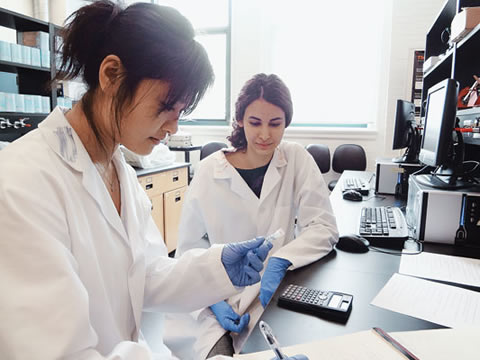Not many undergraduates can say they’ve worked on finding a cure for cancer. But that’s exactly what two upper-year students at the Institute of Biomaterials and Biomedical Engineering did recently as part of an experiment they designed and executed themselves.
The project, by Rozita Abdoli, a chemical engineering major, and Mengqi Wang, a specialist in electrical and computer engineering, examined “HeLa” or cervical cancer cells under stress. Their goal? To find new ways to tackle the disease at the cellular level. In the end, the study didn’t reveal as much as the students had initially hoped, but it provided them with a better understanding of the HeLa cell line, Wang observes.
The study was one of several that third- and fourth-year undergrads at the institute shared recently with the public.
Biomedical engineering majors Tara Stratton and Andrea Pagotto looked at ways to amplify and tag DNA sequences of E. coli bacteria to find an easier way for scientists to test for the deadly organism in freshwater samples. The methods used showed promise, they say.
Richard Gao and Om Bhatt, engineering science specialists, studied the adverse effects of electrical fields on two different stem cell lines. Their study found that many stem cells die when exposed to an amplified electrical field.
Unlike courses where the right answer is the only answer, courses that include major design projects allow students to learn through trial and error – like real scientists do. “Theory is best learned when our students have the opportunity to apply their classroom knowledge to real-world engineering challenges that have the potential to make an impact,” says Prof. Paul Santerre, the institute’s director. “That’s what our students have aspired to in this course.”
Recent Posts
People Worry That AI Will Replace Workers. But It Could Make Some More Productive
These scholars say artificial intelligence could help reduce income inequality
A Sentinel for Global Health
AI is promising a better – and faster – way to monitor the world for emerging medical threats
The Age of Deception
AI is generating a disinformation arms race. The window to stop it may be closing




